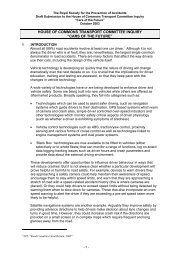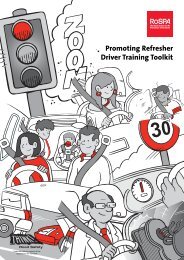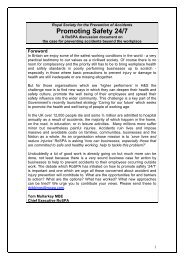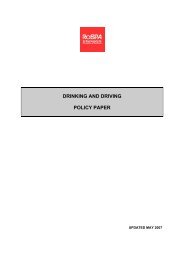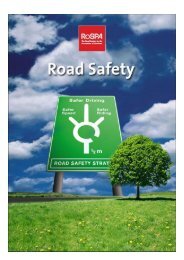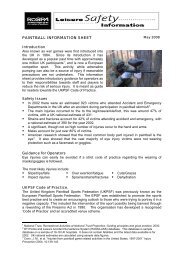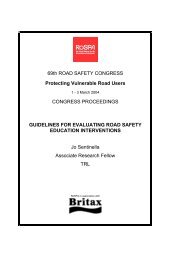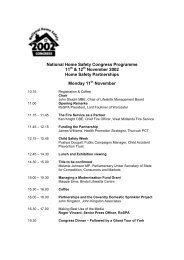RoSPA Young Drivers at Work Report
RoSPA Young Drivers at Work Report
RoSPA Young Drivers at Work Report
Create successful ePaper yourself
Turn your PDF publications into a flip-book with our unique Google optimized e-Paper software.
Chapter 5<br />
●<br />
●<br />
Refresher training, including both the Highway Code<br />
and practical driving skills:<br />
“They [young drivers] learn to drive competently for<br />
the driving test, they are taught well, and then<br />
they immedi<strong>at</strong>ely forget everything they’ve<br />
learned. They themselves admit th<strong>at</strong> the training<br />
they’ve had with us reminds them of things<br />
they’ve forgotten and builds on the skills they’ve<br />
gained in the few years they’ve been driving, to<br />
make a better driver. ”<br />
(Transport Administr<strong>at</strong>or for a voluntary<br />
organis<strong>at</strong>ion, telephone interviewee)<br />
“Renewal of being able to check a vehicle for road<br />
worthiness. It’s frightening how many of them<br />
have never lifted the bonnet since they did it for<br />
their own driving test. ”<br />
(Transport Administr<strong>at</strong>or, telephone interviewee)<br />
Driver responsibility: raising awareness of the potential<br />
consequences of bad driving and the responsibilities of<br />
driving. For instance, the consequences of speeding as<br />
opposed to only learning about the relevant legisl<strong>at</strong>ion.<br />
The responsibilities of drivers for their passengers, as<br />
well as for all other road users:<br />
“Wh<strong>at</strong> I would need; I would need some degree<br />
of m<strong>at</strong>urity because we’re talking about driving<br />
a commercial vehicle th<strong>at</strong>’s logo’d. They need to<br />
be aware of the impact they may have with<br />
regard to other road users, pedestrians and the<br />
general public. ”<br />
(Training Officer, telephone interviewee)<br />
One additional skill respondents reported as desirable, and<br />
which had not been previously mentioned, was awareness<br />
and understanding of in-vehicle technology and safety<br />
fe<strong>at</strong>ures, for example anti-lock braking systems (ABS).<br />
Non-driving skills<br />
Respondents were also asked wh<strong>at</strong> other skills, in addition<br />
to driving skills, they would find useful in a driving<br />
qualific<strong>at</strong>ion. This was an open question although<br />
respondents were offered manual handling and customer<br />
service as prompts. 255 respondents made suggestions, as<br />
shown in Chart 8 in next column.<br />
Chart 8: The non-driving skills which would be useful in a<br />
qualific<strong>at</strong>ion or training programme (N = 407).<br />
Courtesy to other road users<br />
Accident or<br />
breakdown procedures<br />
First aid<br />
Journey planning<br />
Manual handling<br />
Loading a vehicle<br />
Vehicle checks<br />
Customer services<br />
Anger management<br />
None<br />
0 20 40 60 80 100<br />
Number of responses<br />
85 out of 255 respondents (33%) suggested manual<br />
handling. One respondent qualified the answer by noting<br />
th<strong>at</strong> many staff had had handling and loading training but<br />
forgotten it, and another highlighted th<strong>at</strong> employees who<br />
use vans will almost always encounter situ<strong>at</strong>ions where<br />
manual handling skills would be required. Respondents also<br />
raised the issue of training being too generic and not<br />
meeting their specific requirements:<br />
“All these topics are done in-house to our own<br />
desired and exacting standards and would<br />
still be done irrespective of any voc<strong>at</strong>ional<br />
training/testing. ”<br />
(Questionnaire respondent)<br />
“None. It would vary too much company to<br />
company. I want customer service done my way! ”<br />
(Questionnaire respondent, original emphasis)<br />
“We prefer to provide this training in-house because<br />
we can tailor it better to our individual needs. ”<br />
(Questionnaire respondent)<br />
This issue of duplic<strong>at</strong>ion was also raised in the telephone<br />
interviews. For example, manual handling was reported as<br />
a necessary skill but one for which the majority of<br />
organis<strong>at</strong>ions already supplied training:<br />
“We would need focused training so there wasn’t<br />
anything th<strong>at</strong> was superfluous to requirements,<br />
so it was bespoke to you the actual company.<br />
We wouldn’t want a section on how to load a<br />
lorry for example or anything like th<strong>at</strong>. ”<br />
(Business Systems Manager, telephone interviewee)<br />
18 <strong>Young</strong> <strong>Drivers</strong> <strong>at</strong> <strong>Work</strong> <strong>Report</strong>




